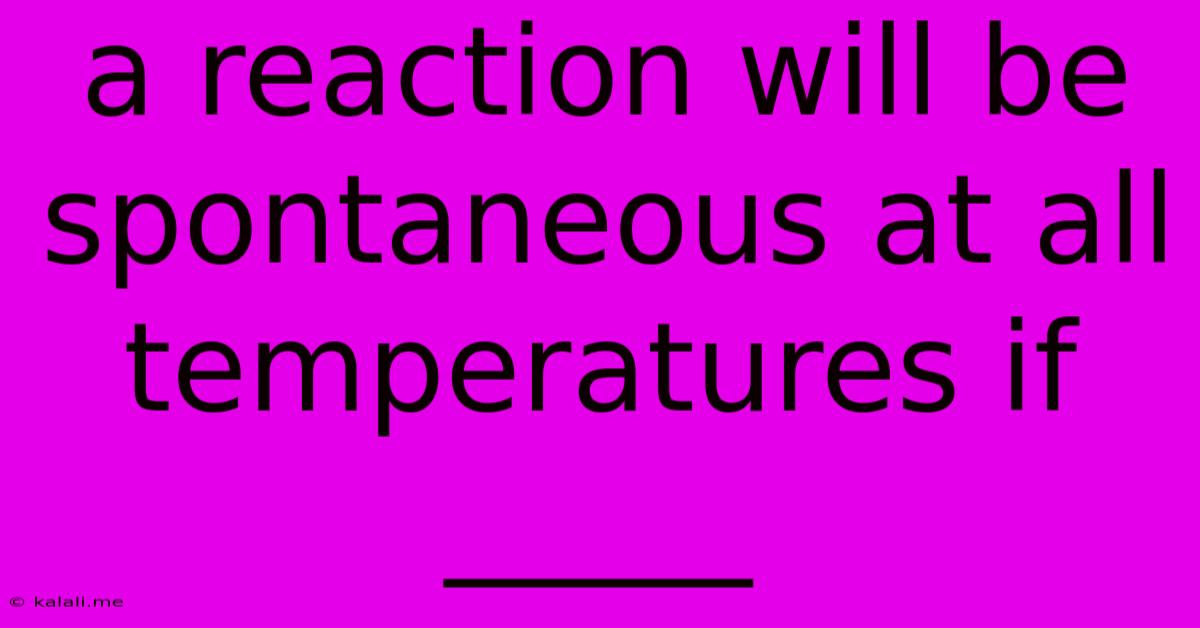A Reaction Will Be Spontaneous At All Temperatures If _____
Kalali
Jun 14, 2025 · 3 min read

Table of Contents
A Reaction Will Be Spontaneous at All Temperatures If ΔS° > 0 and ΔH° < 0
This article explores the thermodynamic conditions under which a chemical reaction will proceed spontaneously at all temperatures. Understanding spontaneity is crucial in chemistry and helps predict the feasibility of reactions under various conditions. This article will delve into the concepts of enthalpy, entropy, and Gibbs Free Energy to explain this phenomenon.
Spontaneity of a reaction is determined by the change in Gibbs Free Energy (ΔG), which combines enthalpy (ΔH) and entropy (ΔS) changes. A reaction is spontaneous if ΔG is negative. The relationship is defined by the equation:
ΔG = ΔH - TΔS
where:
- ΔG is the change in Gibbs Free Energy
- ΔH is the change in enthalpy (heat content)
- T is the absolute temperature (in Kelvin)
- ΔS is the change in entropy (disorder)
For a reaction to be spontaneous at all temperatures, the Gibbs Free Energy (ΔG) must always be negative, regardless of the temperature (T). Let's analyze the equation to determine the conditions that fulfill this requirement:
The Role of Enthalpy (ΔH) and Entropy (ΔS)
-
Enthalpy (ΔH): Enthalpy represents the heat exchanged during a reaction. A negative ΔH (ΔH < 0) indicates an exothermic reaction, where heat is released to the surroundings. Exothermic reactions are generally favored because they release energy, making them more likely to proceed spontaneously.
-
Entropy (ΔS): Entropy is a measure of disorder or randomness in a system. A positive ΔS (ΔS > 0) indicates an increase in disorder during the reaction – the products are more disordered than the reactants. Reactions that increase disorder are thermodynamically favored.
Achieving Spontaneity at All Temperatures
Analyzing the Gibbs Free Energy equation (ΔG = ΔH - TΔS), we can deduce the conditions for spontaneity at all temperatures:
To ensure ΔG is always negative, regardless of the temperature (T), we need:
- ΔH < 0: The reaction must be exothermic, releasing heat to the surroundings. This contributes negatively to ΔG.
- ΔS > 0: The reaction must increase the disorder or randomness of the system. This contributes negatively to ΔG as TΔS will become increasingly positive with increasing temperature, maintaining the negative nature of ΔG.
If both these conditions are met (ΔH < 0 and ΔS > 0), then ΔG will always be negative, irrespective of the temperature. Therefore, the reaction will be spontaneous at all temperatures.
Examples and Implications
Reactions that meet these criteria are relatively rare but highly significant. A perfect example would be a reaction where a highly ordered crystalline structure transforms into a disordered gaseous state, accompanied by a release of heat.
Understanding the spontaneity of reactions is essential for various applications, including:
- Chemical synthesis: Predicting the feasibility of reactions under different conditions.
- Materials science: Designing materials with desired properties.
- Environmental chemistry: Predicting the fate of pollutants in the environment.
In conclusion, a reaction will be spontaneous at all temperatures if the change in enthalpy is negative (ΔH° < 0) and the change in entropy is positive (ΔS° > 0). This combination ensures that the Gibbs Free Energy remains negative regardless of the temperature, making the reaction thermodynamically favorable under all conditions.
Latest Posts
Latest Posts
-
Which Substance Is A Liquid Fuel Used In Rocket Engines
Jun 15, 2025
-
What Is The Least Common Multiple Of 10 14
Jun 15, 2025
-
Marketing A Service Vs A Product
Jun 15, 2025
-
What Is An Antonym For Artificial
Jun 15, 2025
-
Oxidation State Of V In Vo
Jun 15, 2025
Related Post
Thank you for visiting our website which covers about A Reaction Will Be Spontaneous At All Temperatures If _____ . We hope the information provided has been useful to you. Feel free to contact us if you have any questions or need further assistance. See you next time and don't miss to bookmark.